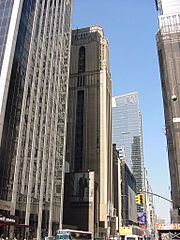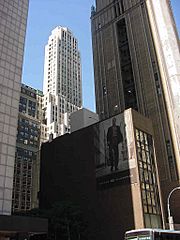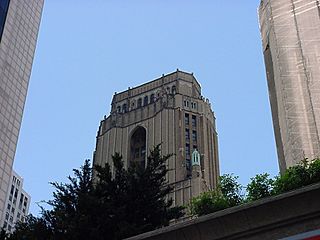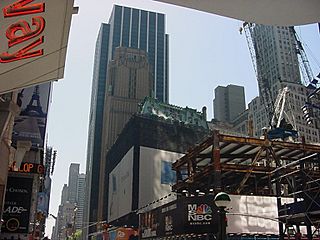Bush Tower facts for kids
Quick facts for kids Bush Tower |
|
|---|---|
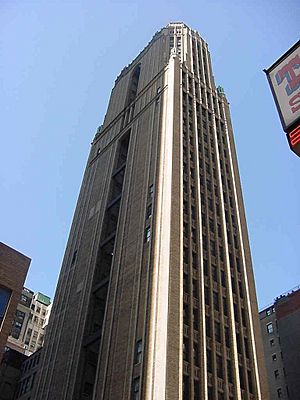 |
|
| General information | |
| Status | Complete |
| Type | Commercial meeting space and display space Office |
| Location | 130-132 West 42nd Street New York, NY 10036 United States |
| Coordinates | 40°45′19″N 73°59′7″W / 40.75528°N 73.98528°W |
| Construction started | 1916 |
| Completed | 1918 |
| Cost | $2 million in 1917 |
| Owner | Bush Terminal Company |
| Height | |
| Roof | 433 ft (132 m) |
| Technical details | |
| Floor count | 30 |
| Lifts/elevators | 4 |
| Design and construction | |
| Architect | Helmle and Corbett |
| Developer | Irving Bush |
| Designated: | October 18, 1988 |
| Reference #: | 1561 |
The Bush Tower, also known as the Bush Terminal International Exhibit Building, is a historic skyscraper in Midtown Manhattan, New York City. It stands 30 stories tall, reaching about 433 feet (132 m) high. You can find it at 130-132 West 42nd Street, close to Times Square.
This building was constructed between 1916 and 1918. It was built for Irving T. Bush's Bush Terminal Company. The company also ran a large business center in Brooklyn. The Bush Tower was first designed as a place for businesses to show off their products. It was also a social spot for buyers. Its unique design combines a narrow shape with great height. It also features a style called Neo-Gothic, which looks like old castles or cathedrals. The New York City Landmarks Preservation Commission recognized Bush Tower as an important city landmark in 1988.
Contents
Building Design
The land for Bush Tower was quite small. It was only 50 feet (15 m) wide and 90 feet (27 m) long. But the building itself rose over 433 feet (132 m) high! The New York architecture firm Helmle and Corbett designed it. Architect Harvey Wiley Corbett was key to its look.
They gave Bush Tower a Neo-Gothic style. This was similar to the Woolworth Building in Lower Manhattan, which was finished a few years earlier. The architects said they wanted the building to be "a model for the tall, narrow building in the center of a city block." This means it was a great example of how to build tall buildings on small city plots.
Bush Tower became very important in how skyscrapers were designed later on. Another famous architect, Raymond Hood, said this building influenced his American Radiator Building from 1924. Bush Tower was written about in popular magazines like Literary Digest and Vanity Fair. It was the tallest building in Midtown Manhattan when it was finished. It also showed that the main business area of Manhattan was moving to Midtown.
Outside Look
Because the building was only 50 feet (15 m) wide, it didn't need many windows on its sides. Most windows are on the north side (facing 42nd Street) and the south side. The east and west walls are mostly plain. However, on the east side, there's a small open space called a lightwell. This helps bring light into the middle of the building.
The plain walls have special brickwork that looks like vertical "ribs." This clever painting, called Trompe-l'œil, makes the building look even taller. The very top floor has tall, pointed arched windows. Even the water tower on the roof is hidden. It's covered by a special sloped roof called a mansard roof.
Inside the Tower
The first three floors of Bush Tower were made for buyers visiting New York. These floors were like a fancy private club. They were home to the International Buyers Club. Any business with a good reputation could join for free. The company made sure these floors were welcoming to women members too.
The club offered many useful things. There were conference rooms for meetings and several lounges to relax in. It had offices, a buffet for food, and a large reading room on the second floor. This room even had trained librarians to help. The third floor had an auditorium. Here, people could attend lectures or concerts. They could also watch promotional films from manufacturers or even see "fashion parades" showing new clothes.
These lower floors were decorated in an "Old English" style. They had lots of oak wood panels, soft oriental carpets, and old-fashioned furniture. The company said it felt like entering a "hundred-year-old tavern."
The upper 27 stories of the tower were used to display products from different manufacturers. It was like a "museum for business." This allowed buyers to see many different goods all in one place.
History of Bush Tower
How it Started
Irving T. Bush and his company created Bush Tower to bring together buyers, manufacturers, and designers. They wanted to create a "vast centralized marketplace under one roof." This meant people could see many different products without wasting time traveling around.
The Bush Terminal Company tried a similar idea in London with Bush House. That building was constructed in the 1920s. However, the idea of combining displays and social spaces wasn't fully carried out there.
How it Was Used
The Buyers' Club on the lower floors didn't last long. A bank took its place in the early 1920s. Then, in 1931, the Old London Restaurant moved in. In 1938, the Metropolitan Life Insurance Company took over the tower. After that, the upper floors were changed into regular offices.
Over the years, many different businesses moved into Bush Tower. In 1939, a group of dress manufacturers moved to the tenth floor. By 1941, six more businesses and offices had taken space. A sporting goods store called Herman's Stores opened on the ground floor in 1943. Later that year, the American Red Cross and two other groups also moved in.
The tower was bought and sold several times. In 1945, real estate investor Jacob Freidus bought and then auctioned it off. In 1951, a group led by real estate developer Joseph Durst bought it.
By the early 1980s, the area around Times Square and Bush Tower itself had become run down. The owners even thought about tearing the building down. Instead, they decided to fix it up. They replaced the heating and electrical systems. In the 1980s, the Lebanese Dalloul family bought the skyscraper. In 1988, the New York City Landmarks Preservation Commission officially named Bush Tower a city landmark.
In 2002, the owners announced plans for a new building next to Bush Tower. This new 23-story glass tower would be connected to Bush Tower on every floor. This would double the original building's space. In 2006, a company from Dubai bought the properties next to Bush Tower.
Gallery
-
Looking west from 6th Avenue & 42nd Street.
-
View from Times Square; 1095 Avenue of the Americas looms behind it
Images for kids
-
Seen from the base of the Bank of America Tower, looking west
-
Viewed from east; 1095 Avenue of the Americas is in the background
See also
 In Spanish: Bush Tower para niños
In Spanish: Bush Tower para niños
 | Emma Amos |
 | Edward Mitchell Bannister |
 | Larry D. Alexander |
 | Ernie Barnes |


